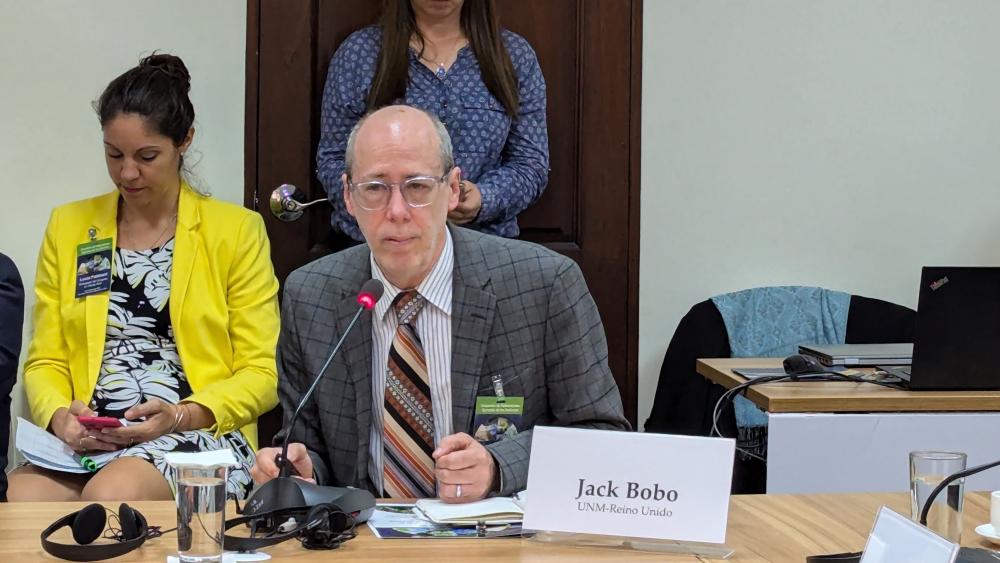The next 25 years will be the most important in the history of agriculture, warns Jack Bobo, agrifood system specialist, who has been named as the world’s leading expert on science communication

San Jose, 23 July 2024 (IICA) – “The next 25 years will be the most important in the history of agriculture. Therefore, we must take the right actions and if we succeed during that period, we will be all right forever”.
This was the view of Professor Jack Bobo, Director of the Food Systems Institute at the University of Nottingham in the United Kingdom, who has been recognized globally for his innovative work in science communication. Due to his prestige, it was recently announced that the World Food Prize Foundation in Iowa, United States will award him the Borlaug CAST Communication Award in October.
Bobo is in San Jose, Costa Rica, attending a two-day debate on the future of agriculture, along with a dozen ministers of Agriculture of the Americas and other senior officials of the sector. The deliberations are taking place at the Headquarters of the Inter-American Institute for Cooperation on Agriculture (IICA), during the 44th Regular Meeting of the Executive Committee, one of the organization’s governing bodies.
Why will the coming years be the most critical for agriculture? This was Bobo’s explanation.
He pointed out that by 2050, the global population will have reached 9.5 billion and after that time many expect conditions to become increasingly worse. “But the truth is that population growth will fall dramatically before then, because we are having few children and the number of children born will become increasingly less. Population growth during those years will stem from the fact that people will be living longer. This is good news for health and nutrition, but we won’t live forever”.
He stressed that, “Therefore, the challenge will not be to increasingly produce more food forever. The challenge will be to reach 2050 without cutting down all our forests or drying up all our rivers, lagoons and aquifers. From now until 2050, it will become increasingly more difficult to feed the world, but things will get easier after 2050, if we haven’t ruined the planet by then”.
Speaking about the Borlaug CAST Communication Award to be conferred on him by the World Food Prize Foundation, he described it as, “a very important award that raises the profile and importance of communication. It demonstrates that what we are doing in science is not sufficient. We must also communicate our actions in science, so that people will understand if, value it and be willing to adopt innovations. This prize will provide me with a platform to be heard by more audiences”.
Moreover, Bobo stressed that an institution like IICA plays a fundamental role in ensuring that the innovations that assist in making agriculture more productive and sustainable are disseminated and made available to farmers. He is convinced that the organization can contribute to accelerating transformation in the region, given that it has established linkages with governments and other sectors, which will enable it to change the nature of the conversation and contribute to ensuring that changes are made.
Vision of agriculture
The expert, who worked for 13 years for the government and the United States State Department in the area of global food policy, believes that many people today have a mistaken view of agriculture.
“Admittedly—he agreed—agriculture has an enormous impact on the environment. It uses 40% of the planet’s land area, 70% of its fresh water and generates almost one third of climate change-related emissions. However, every day approximately 800 million people, that is, 10% of the global population, go to bed hungry. This would suggest that agrifood systems are not functioning. Yet, if we look back at where we are coming from, we will come to a different conclusion. Some 30 years ago, 20% of the population was suffering from hunger and 60 years ago, it was 30%. Of course, 10% is an unacceptable figure and we must do better, but we are much better off than we were in the past. So, the question arises: when were our agrifood systems better than they are today? The answer is: never”.
Bobo is convinced that a great deal of false information is being circulated and the truth is that, in many ways, things are and will continue to get better, albeit not as quickly as needed. This means that we must accelerate the pace of change instead of blaming farmers for not doing more.
The scientist, who also worked in the private sector and in the environmental sector, point out two key elements that will accelerate the pace of change: more public policies and greater investment, providing more money and more resources, while focusing on consumers.
Finally, he argued that, “We must try and ensure that the public not only supports innovation, but demands it. Thus, the consumer will need to truly understand the role of innovation in our society. Quite often, people speak passionately about food, but without really understanding the nature of production, as many of them are far removed from the rural areas where their parents and grandparents grew up. Therefore, we have to do a better job of ensuring the commitment of consumers to demand products that are truly beneficial. We face daunting challenges ahead and no-one can resolve them alone; and we have only one generation to achieve our objectives”.
More information:
Institutional Communication Division.
comunicacion.institucional@iica.int